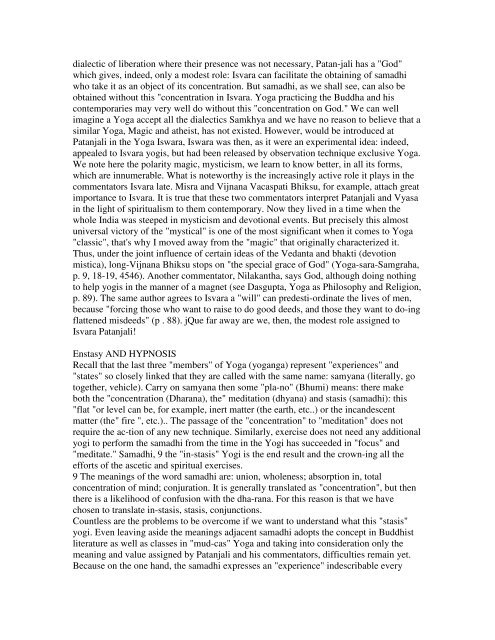Mircea Eliade YOGA IMMORTALITY AND ... - Brihaspati.net
Mircea Eliade YOGA IMMORTALITY AND ... - Brihaspati.net
Mircea Eliade YOGA IMMORTALITY AND ... - Brihaspati.net
You also want an ePaper? Increase the reach of your titles
YUMPU automatically turns print PDFs into web optimized ePapers that Google loves.
dialectic of liberation where their presence was not necessary, Patan-jali has a "God"<br />
which gives, indeed, only a modest role: Isvara can facilitate the obtaining of samadhi<br />
who take it as an object of its concentration. But samadhi, as we shall see, can also be<br />
obtained without this "concentration in Isvara. Yoga practicing the Buddha and his<br />
contemporaries may very well do without this "concentration on God." We can well<br />
imagine a Yoga accept all the dialectics Samkhya and we have no reason to believe that a<br />
similar Yoga, Magic and atheist, has not existed. However, would be introduced at<br />
Patanjali in the Yoga Iswara, Iswara was then, as it were an experimental idea: indeed,<br />
appealed to Isvara yogis, but had been released by observation technique exclusive Yoga.<br />
We note here the polarity magic, mysticism, we learn to know better, in all its forms,<br />
which are innumerable. What is noteworthy is the increasingly active role it plays in the<br />
commentators Isvara late. Misra and Vijnana Vacaspati Bhiksu, for example, attach great<br />
importance to Isvara. It is true that these two commentators interpret Patanjali and Vyasa<br />
in the light of spiritualism to them contemporary. Now they lived in a time when the<br />
whole India was steeped in mysticism and devotional events. But precisely this almost<br />
universal victory of the "mystical" is one of the most significant when it comes to Yoga<br />
"classic", that's why I moved away from the "magic" that originally characterized it.<br />
Thus, under the joint influence of certain ideas of the Vedanta and bhakti (devotion<br />
mistica), long-Vijnana Bhiksu stops on "the special grace of God" (Yoga-sara-Samgraha,<br />
p. 9, 18-19, 4546). Another commentator, Nilakantha, says God, although doing nothing<br />
to help yogis in the manner of a mag<strong>net</strong> (see Dasgupta, Yoga as Philosophy and Religion,<br />
p. 89). The same author agrees to Isvara a "will" can predesti-ordinate the lives of men,<br />
because "forcing those who want to raise to do good deeds, and those they want to do-ing<br />
flattened misdeeds" (p . 88). jQue far away are we, then, the modest role assigned to<br />
Isvara Patanjali!<br />
Enstasy <strong>AND</strong> HYPNOSIS<br />
Recall that the last three "members" of Yoga (yoganga) represent "experiences" and<br />
"states" so closely linked that they are called with the same name: samyana (literally, go<br />
together, vehicle). Carry on samyana then some "pla-no" (Bhumi) means: there make<br />
both the "concentration (Dharana), the" meditation (dhyana) and stasis (samadhi): this<br />
"flat "or level can be, for example, inert matter (the earth, etc..) or the incandescent<br />
matter (the" fire ", etc.).. The passage of the "concentration" to "meditation" does not<br />
require the ac-tion of any new technique. Similarly, exercise does not need any additional<br />
yogi to perform the samadhi from the time in the Yogi has succeeded in "focus" and<br />
"meditate." Samadhi, 9 the "in-stasis" Yogi is the end result and the crown-ing all the<br />
efforts of the ascetic and spiritual exercises.<br />
9 The meanings of the word samadhi are: union, wholeness; absorption in, total<br />
concentration of mind; conjuration. It is generally translated as "concentration", but then<br />
there is a likelihood of confusion with the dha-rana. For this reason is that we have<br />
chosen to translate in-stasis, stasis, conjunctions.<br />
Countless are the problems to be overcome if we want to understand what this "stasis"<br />
yogi. Even leaving aside the meanings adjacent samadhi adopts the concept in Buddhist<br />
literature as well as classes in "mud-cas" Yoga and taking into consideration only the<br />
meaning and value assigned by Patanjali and his commentators, difficulties remain yet.<br />
Because on the one hand, the samadhi expresses an "experience" indescribable every







